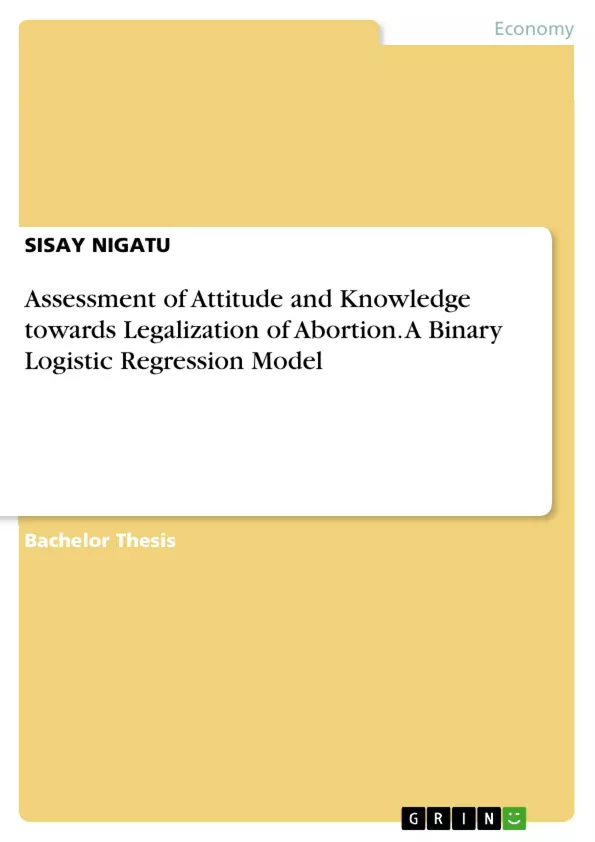Abortion is one of the major health problems in our country and the issue of abortion is twisted with a host of political, religious and moral concerns. But regardless the constraints produced by the environment in which they live, a number of female seek induced abortion. The aim of this study is to assess the level of knowledge and attitude of female students towards legalization of abortion in College of Natural Science of Addis Ababa University. Thus, the target population of this study is all undergraduate Biology department female students in College of Natural Science of Addis Ababa University.
The number of female students considered for this study was 70 using stratified random sampling technique. The analysis were done through descriptive statistics including crosstabulation and bar charts and from inferential statistics Chi-square test of independence and Logistic regression model, which are used to determine the factor that affect female student attitude and knowledge on legalization of abortion. Based on the result of this research paper, place of residents and marital status is the most effective variable to affect the attitude and knowledge of female student on legalization of abortion.
Table of Contents
- CHAPTER ONE.
- INTRODUCTION.
- CHAPTER TWO
- LITERATURE REVIEW.
- CHAPTER THREE
- METHODOLOGY..
- CHAPTER FOUR
- STATISTICAL DATA ANALYSIS..
- CHAPTER FIVE.
Objectives and Key Themes
The study aims to assess the level of knowledge and attitude of female students towards the legalization of abortion at the College of Natural Science of Addis Ababa University. The research investigates the factors that influence student attitudes and knowledge on this sensitive topic.
- Knowledge and attitudes of female students regarding abortion legalization.
- Factors influencing student attitudes and knowledge on abortion.
- The impact of legalizing abortion on female students.
- The role of education and societal norms in shaping attitudes towards abortion.
- The ethical considerations surrounding abortion legalization.
Chapter Summaries
Chapter One introduces the study and provides background information on the topic of abortion, highlighting its significance in the context of Ethiopia. It outlines the objectives, research questions, and methodology used in the study. Chapter Two reviews existing literature on abortion, focusing on perspectives from various disciplines and exploring the legal, ethical, and social implications of abortion in Ethiopia. Chapter Three details the research methodology, including the study design, sampling technique, data collection methods, and data analysis techniques. Chapter Four presents the statistical data analysis, examining the relationship between factors influencing student attitudes and knowledge on abortion legalization. This chapter uses various statistical methods, including descriptive statistics, Chi-square tests, and logistic regression models, to interpret the findings.
Keywords
This study focuses on key concepts like abortion legalization, student attitudes and knowledge, factors influencing attitudes, descriptive and inferential statistics, Chi-square tests, logistic regression models, and the impact of legalizing abortion in the context of Ethiopia. It also explores the influence of place of residence and marital status on attitudes and knowledge surrounding abortion.
Frequently Asked Questions
What was the primary goal of the study at Addis Ababa University?
The study aimed to assess the knowledge and attitudes of female undergraduate biology students towards the legalization of abortion in Ethiopia.
Which factors most significantly influenced student attitudes toward abortion?
According to the research, place of residence and marital status were the most effective variables affecting students' attitudes and knowledge.
What statistical methods were used to analyze the data?
The study utilized descriptive statistics (cross-tabulation, charts) and inferential statistics, including Chi-square tests and Binary Logistic Regression models.
Why is abortion considered a major health problem in Ethiopia?
Abortion is a significant issue due to the high number of females seeking induced abortions despite political, religious, and moral constraints.
What role does education play in shaping these attitudes?
The study explores how academic settings and societal norms interact to influence how female students perceive the ethics and legality of abortion.
- Quote paper
- SISAY NIGATU (Author), 2021, Assessment of Attitude and Knowledge towards Legalization of Abortion. A Binary Logistic Regression Model, Munich, GRIN Verlag, https://www.grin.com/document/1146966



